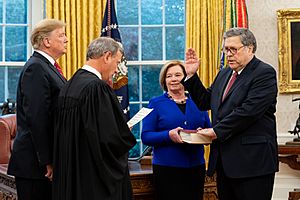William Barr facts for kids
Quick facts for kids
William Barr
|
|
|---|---|
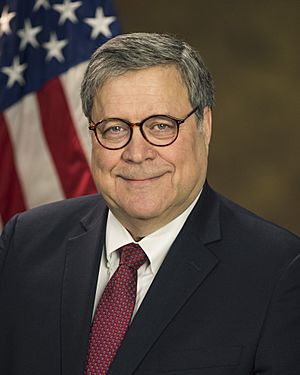
Official portrait, 2019
|
|
| 77th and 85th United States Attorney General | |
| In office February 14, 2019 – December 23, 2020 |
|
| President | Donald Trump |
| Deputy |
|
| Preceded by |
|
| Succeeded by | Merrick Garland |
| In office November 26, 1991 – January 20, 1993 Acting: August 16, 1991 – November 26, 1991 |
|
| President | George H. W. Bush |
| Deputy | George J. Terwilliger III |
| Preceded by | Dick Thornburgh |
| Succeeded by | Janet Reno |
| 25th United States Deputy Attorney General | |
| In office May 26, 1990 – November 26, 1991 |
|
| President | George H. W. Bush |
| Preceded by | Donald B. Ayer |
| Succeeded by | George J. Terwilliger III |
| United States Assistant Attorney General for the Office of Legal Counsel | |
| In office January 20, 1989 – May 26, 1990 |
|
| President | George H. W. Bush |
| Preceded by | Douglas Kmiec |
| Succeeded by | J. Michael Luttig |
| Personal details | |
| Born |
William Pelham Barr
May 23, 1950 New York City, U.S. |
| Political party | Republican |
| Spouse |
Christine Moynihan
(m. 1973) |
| Children | 3 |
| Parents |
|
| Relatives | Stephen Barr (brother) |
| Education | Columbia University (BA, MA) George Washington University (JD) |
| Signature | |
William Pelham Barr (born May 23, 1950) is an American lawyer. He served as the United States Attorney General for two different presidents. He worked for President George H. W. Bush from 1991 to 1993. Later, he served President Donald Trump from 2019 to 2020.
Barr was born and grew up in New York City. He studied at Columbia University and George Washington University Law School. Before becoming Attorney General, he worked for the Central Intelligence Agency (CIA). He also worked as a law clerk and for a law firm. He held several important jobs in the Department of Justice. After his first time as Attorney General, he worked for large companies like Verizon Communications.
Barr believes that the President should have strong authority over the government. During his time in office, he made decisions on important issues. These included a prison hostage situation and policies about crime. He also advised President Bush to pardon some officials. His second term as Attorney General involved many challenges. He faced criticism for how he handled certain situations. He resigned in December 2020.
Early Life and Education
Barr was born in New York City in 1950. His father, Donald Barr, was an English literature teacher at Columbia University. His mother, Mary Margaret, also taught at Columbia. Barr was raised Catholic. He is the second of four sons. His younger brother, Stephen Barr, is a physics professor.
Barr grew up on the Upper West Side of New York City. He went to a Catholic elementary school. Then he attended the Horace Mann School. After high school, he went to Columbia University. He studied government and earned a Bachelor of Arts degree in 1971. He continued his studies at Columbia for two more years. He received a Master of Arts degree in government and Chinese studies in 1973.
After college, Barr moved to Washington, D.C. He started working as an intelligence analyst for the Central Intelligence Agency (CIA). While working, he also attended George Washington University Law School at night. He graduated in 1977 with a law degree.
Career Highlights
Early Career Steps
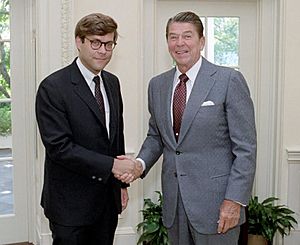
Barr worked for the CIA from 1971 to 1977. He started as a summer intern. Later, he became an analyst and a contact person for Congress.
After law school, Barr worked for a judge for one year. Then he joined a law firm called Shaw, Pittman, Potts & Trowbridge. He also spent a year working in the Ronald Reagan White House. There, he helped with legal policies. Barr has never worked as a prosecutor on a court case.
Working for the U.S. Department of Justice
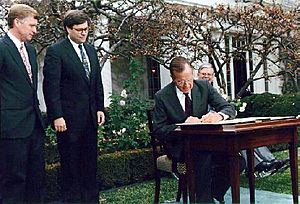
In 1989, President George H. W. Bush appointed Barr to the U.S. Department of Justice. He became the Assistant Attorney General for the Office of Legal Counsel (OLC). This office gives legal advice to the President and other government agencies. Barr was known for supporting strong presidential powers. He wrote a legal opinion that supported a military action in Panama. He also supported the idea of bringing fugitives from other countries to the U.S. without their government's permission.
U.S. Deputy Attorney General (1990–1991)
In May 1990, Barr was made United States Deputy Attorney General. This role meant he was in charge of the daily operations of the Justice Department. People generally praised him for how well he managed the department.
In August 1991, the Attorney General resigned. Barr became the Acting Attorney General. A few days later, inmates took hostages at a federal prison in Talladega. Barr ordered the FBI's Hostage Rescue Team to act. They successfully freed all the hostages without anyone losing their life.
U.S. Attorney General (1991–1993)
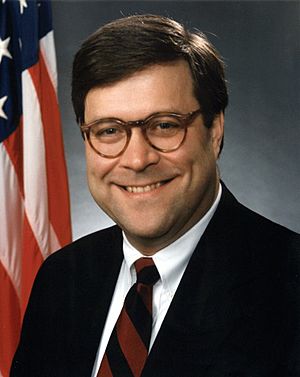
President Bush was impressed by Barr's handling of the hostage crisis. Weeks later, he nominated Barr to be the Attorney General.
Barr was well-respected by both Republican and Democratic politicians. His confirmation hearing was calm, and he was approved easily by the Senate. He became Attorney General on November 26, 1991.
During his first time as Attorney General, Barr was seen as a strong conservative. He believed in tough policies to fight crime. He thought that more prisons were needed to reduce violent crime. He even moved 300 FBI agents to focus on gang violence. This was a big change for the FBI.
After His First Term
After leaving the Justice Department in 1993, Barr worked on making criminal justice policies tougher in Virginia. He helped to end parole in the state. He also said that spending more money on social programs would not stop crime. He believed crime was caused by a lack of good morals.
In 1994, Barr became a top lawyer for a telecommunications company called GTE Corporation. He worked there for 14 years. When GTE merged with another company to become Verizon Communications, Barr became their general counsel. He retired in 2008 and became a multimillionaire. From 2009 to 2018, he was on the board of directors for Time Warner.
Political Donations
Barr gave money to the National Republican Senatorial Committee (NRSC). This group helps Republican candidates running for the Senate. He donated a lot of money between 2009 and 2019. He stopped donating after he was confirmed as Attorney General in 2019.
U.S. Attorney General (2019–2020)
Second Time as Attorney General
On December 7, 2018, President Donald Trump announced he would nominate Barr to be Attorney General again. Barr had supported some of Trump's actions and questioned parts of the investigation into Russian interference in the 2016 election.
Barr was confirmed as Attorney General on February 14, 2019. He was sworn in by Chief Justice John Roberts. He is only the second person to serve as U.S. Attorney General for two terms that were not back-to-back.
During his second term, Barr was seen as a strong supporter of President Trump. He supported Trump's political plans. He also faced criticism for how he handled certain situations. These included the release of a report on Russian interference in the 2016 election. He also made decisions about federal executions. In December 2020, Barr stated that investigations found no evidence of widespread issues that would have changed the outcome of the presidential election.
Resignation
On December 14, 2020, President Trump announced that Barr would resign. Barr confirmed his resignation in a letter. His last day was December 23. Many people said that Barr brought the Justice Department very close to the White House. They noted that he often made decisions that matched President Trump's wishes.
Political Views
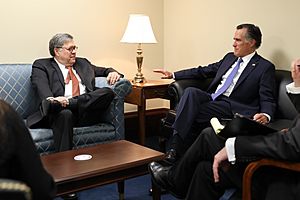
Barr is a lifelong Republican. He believes the President should have broad powers. He also supports "law and order" policies. During his second term, he became known for his loyalty to President Trump.
Immigration Policies
As Deputy Attorney General, Barr worked to prevent people with certain health conditions from entering the United States. He also supported using Guantánamo Bay to hold refugees. He supported strong "law and order" rules on immigration.
Executive Powers
Barr believes the President has wide-ranging powers. He has argued that the President has "complete authority to start or stop a law enforcement proceeding."
Race Relations
In June 2020, during protests against racism, Barr said he did not believe the law enforcement system was "systemically racist". He also said that police shootings of unarmed African American men were "very rare."
Views on China
In July 2020, Barr criticized large American technology companies and Hollywood studios. He accused them of trying to please the Communist Party of China for money. He said Hollywood often changes its movies to make China happy.
Personal Life
Barr has been married to Christine Moynihan Barr since 1973. They have three daughters: Mary, Patricia, and Margaret. Mary and Patricia have worked in government roles. Margaret is a lawyer and cancer survivor.
Barr is a Roman Catholic. He is a member of the National Catholic Prayer Breakfast. He also served on the board of the Catholic Information Center.
Barr enjoys playing the bagpipes. He started playing when he was eight years old. He has even competed in Scotland. He was once a member of the City of Washington Pipe Band.
Barr's brother is Stephen Barr, a physics professor. Barr and Robert Mueller have been friends since the 1980s. Mueller attended the weddings of two of Barr's daughters.
Honors
In 1992, George Washington University gave him an honorary law degree.
See also
 In Spanish: William Barr para niños
In Spanish: William Barr para niños


